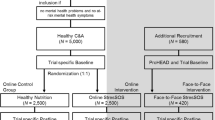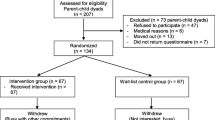Abstract
Aim
Adolescence is a critical life stage with significant effects on lifestyle in later life. Promoting adolescents’ lifestyle requires the use of appropriate educational approaches. This study aimed to evaluate the effects of face-to-face education for student health ambassadors (SHA) on the health-promoting lifestyle of adolescent female students.
Subject and methods
This randomized controlled trial was conducted in 2018. A random sample of 208 adolescent female students was recruited from public schools for girls in Tehran, Iran, and allocated through cluster randomization to a control and an intervention group. Twelve students were selected from the intervention group as SHAs and were provided with face-to-face training about health-promoting lifestyle in five one-hour sessions. Then, they provided indirect education about health-promoting lifestyle to their peers during daily school activities and conversations. Prior to and two months after the study intervention, participants’ health-promoting lifestyle was assessed using the Adolescent Health Promotion Short Form. The SPSS program (v. 24.0) was used for data description, and the Stata program (v. 13.0) was used for data analysis using the independent-samples t test, the chi-square test, and linear regression analysis.
Results
There were no significant between-group differences with respect to the pretest mean scores of health-promoting lifestyle and its dimensions (P > 0.05). However, the post-test mean scores a of health-promoting lifestyle and its dimensions in the intervention group were significantly greater than the control group (P < 0.001).
Conclusion
Face-to-face education for SHAs significantly improves the success of their positive influence on the health-promoting lifestyle of adolescent female students. Integration of face-to-face training in ambassador-based health-promotion programs is recommended to increase the effectiveness of such programs.

Similar content being viewed by others
References
Arazi S, Karahroudi FA, Rouhani C, Puorhoseingholi A, Vasli P (2017) The effect of health promoting education plan on adolescents’ lifestyle in patients with thalassemia major. J Nurs Educ 6(1):16–22. https://doi.org/10.21859/jne-06013
Balali Meybodi F, Hasani M, Mehdinejad M (2017) Evaluating health-promoting life style and its related factors among adolescent girls of Kerman in 2015. Health Dev J 6(2):85–96
Bogart LM, Cowgill BO, Elliott MN, Klein DJ, Hawes-Dawson J, Uyeda K, Elijah J, Binkle DG, Schuster MA (2014) A randomized controlled trial of students for nutrition and eXercise: a community-based participatory research study. J Adolesc Health 55(3):415–422. https://doi.org/10.1016/j.jadohealth.2014.03.003
Castro CM, Pruitt LA, Buman MP, King AC (2011) Physical activity program delivery by professionals versus volunteers: the TEAM randomized trial. Health Psychol 30(3):285–294. https://doi.org/10.1037/a0021980
Chen MY, Lai LJ, Chen HC, Gaete J (2014) Development and validation of the short-form adolescent health promotion scale. BMC Public Health 14(1):1–9. https://doi.org/10.1186/1471-2458-14-1106
Cheng VC, Tai JW, Li WS, Chau PH, So SY, Wong LM, Ching RH, Ng MM, Ho SK, Lee DW, Lee WM (2016) Implementation of directly observed patient hand hygiene for hospitalized patients by hand hygiene ambassadors in Hong Kong. Am J Infect Control 44(6):621–624. https://doi.org/10.1016/j.ajic.2015.11.024
Cherry AL, Baltag V, Dillon ME (2016) International handbook on adolescent health and development, The Public Health Response. Springer International Publishing, Switzerland
Cui Z, Shah S, Yan L, Pan Y, Gao A, Shi X, Wu Y, Dibley MJ (2012) Effect of a school-based peer education intervention on physical activity and sedentary behaviour in Chinese adolescents: a pilot study. BMJ open 2(3). https://doi.org/10.1136/bmjopen-2011-000721
Dehghani A, Mohammadkhan Kermanshahi S, Memarian R, Baharlou R (2012) The effect of peer group education on anxiety of patients with multiple sclerosis. Iran J Med Educ 12(4):249–257
Heshmati H, Alizadeh SH, Adib MS, Khajavi S, Rafiee N And Behnampour, N., 2014 Self-care pattern related to life style and its related factors among female high school students in Gorgan in 2013 J Torbat Heydariyeh Univ Med Sci 2(6):40–48
Iranian Ministry of Health, Treatment and Medical Education (2017) Student Health Ambassadors Program Implementation Guidelines (in Persian). Available at: http://health.tums.ac.ir/uploads/%D8%AF%D8%B3%D8%AA%D9%88%D8%B1%D8%A7%D9%84%D8%B9%D9%85%D9%84%20%D8%B3%D9%81%D9%8A%D8%B1%D8%A7%D9%86%20%D8%B3%D9%84%D8%A7%D9%85%D8%AA%20%D8%AF%D8%A7%D9%86%D8%B4%20%D8%A2%D9%85%D9%88%D8%B2%DB%8C%20(2).pdf.Accessed 12 July 2018
Lloyd J, Dean S, Creanor S, Abraham C, Hillsdon M, Ryan E, Wyatt KM (2017) Intervention fidelity in the definitive cluster randomised controlled trial of the healthy lifestyles Programme (HeLP) trial: findings from the process evaluation. Int J Behav Nutr Phys Act 14(1):1–14 https://doi.org/10.1186/s12966-017-0616-6
Madani A, Alizade A, Ghanbarnejad A, Aghamolaei T (2015) Effect of peer education on health promoting behaviors of high school students. Iran J Health Educ Health Promot 3(2):105–115
Nelson SA, Nickols-Richardson SM (2014) A systematic review of peer nutrition education in childhood and adolescence. Health Behav Policy Rev 1(4):247–264. https://doi.org/10.14485/HBPR.1.4.1
Nies MA, McEwen M (2018) Community/public health nursing-E-book: promoting the health of populations. Elsevier Health Sciences, USA
Raj S, Senjam SS, Singh A (2013) Assessment of health-promoting behavior and lifestyle of adolescents of a north Indian city. Int J Prev Med 4(10):1189–1193
Safabakhsh L, Nazemzadeh M (2013) The effect of health promotion education on high school students’ lifestyle. Iran J Med Educ 13(1):58–65
Schoberberger R, Böhm G, Schroeder Y (2015) Heavy dependent nicotine smokers–newfound lifestyle appreciation after quitting successfully. Experiences from inpatient smoking cessation therapy. Public Health 129(5):539–544. https://doi.org/10.1016/j.puhe.2015.02.011
Sheybani R, Hosseini Z, Davoodi SH, Aghamolaei T, Ghanbarnejad A (2018) The effect of peer education intervention on consumption of fruits and vegetables in housewives. J Prev Med 5(2):11–19
Snelling AM (ed) (2014) Introduction to health promotion. Wiley, San Francisco
Stanhope M, Faan RD, Lancaster J, Faan RP (2019) Public Health Nursing E-book: Population-Centered Health Care in the Community. Elsevier Health Sciences, Canada
Vaezi AA, Pazokian M, Yekefallah F, Samieefard F (2012) Study of lifestyle and preventive behaviors of osteoporosis among adolescents in Qazvin. SSU_J 20(3):259–268
Vines AI, Hunter JC, Carlisle VA, Richmond AN (2017) Prostate cancer ambassadors: process and outcomes of a prostate cancer informed decision-making training program. Am J Mens Health 11(1):54–62. https://doi.org/10.1177/1557988316644979
World Health Organization (WHO) (2018) Adolescent Health. www.who.int/maternal_child_adolescent/.../adolescence/aa-ha-guidance-full-draft.pdf Accessed 1 June 2018
Yadaki MR, Zendehtalab HR, Reza S (2017) Effect of peer education on health promoting lifestyle among volunteer health care communicators. JNE 6(2):9–18
Yan Z, Finn K, Cardinal BJ, Bent L (2014) Promoting health behaviors using peer education: a demonstration project between international and American college students. Am J Health Educ 45(5):288–296. https://doi.org/10.1080/19325037.2014.932727
Author information
Authors and Affiliations
Corresponding author
Ethics declarations
Conflict of interest
The authors declare that they have no conflict of interest.
Informed consent
Informed consent was collected from every participant.
Additional information
Publisher’s note
Springer Nature remains neutral with regard to jurisdictional claims in published maps and institutional affiliations.
Rights and permissions
About this article
Cite this article
Sarkhani, N., Negarandeh, R. & Pashaeypoor, S. The effects of face-to-face education for student health ambassadors on the health-promoting lifestyle of adolescent female students: a randomized controlled trial. J Public Health (Berl.) 30, 1345–1351 (2022). https://doi.org/10.1007/s10389-020-01439-0
Received:
Accepted:
Published:
Issue Date:
DOI: https://doi.org/10.1007/s10389-020-01439-0




